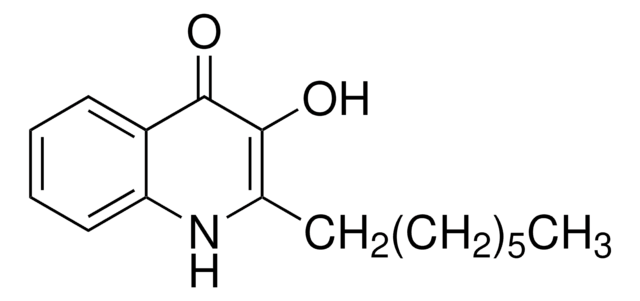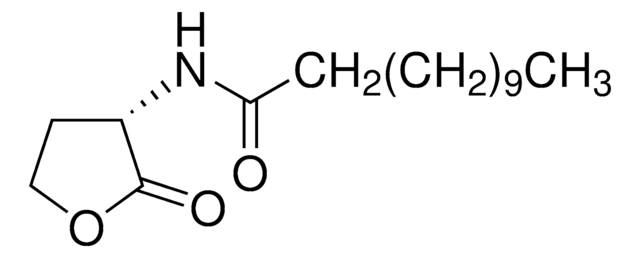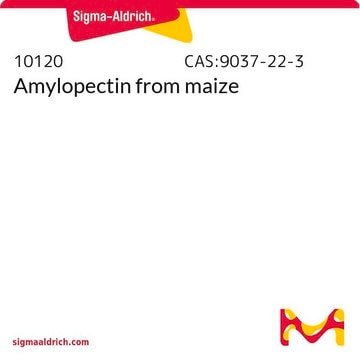SML0747
HHQ
≥98% (HPLC)
Synonym(s):
2-Heptyl-4-quinolone
Sign Into View Organizational & Contract Pricing
All Photos(1)
About This Item
Empirical Formula (Hill Notation):
C16H21NO
CAS Number:
Molecular Weight:
243.34
UNSPSC Code:
12352200
NACRES:
NA.77
Recommended Products
Quality Level
Assay
≥98% (HPLC)
form
powder
storage condition
protect from light
color
white to beige
solubility
DMSO: 5 mg/mL, clear
storage temp.
2-8°C
InChI
1S/C16H21NO/c1-2-3-4-5-6-9-13-12-16(18)14-10-7-8-11-15(14)17-13/h7-8,10-12H,2-6,9H2,1H3,(H,17,18)
InChI key
UYRHHBXYXSYGHA-UHFFFAOYSA-N
General description
HHQ belongs to 2-alkyl-4-quinolone compounds, which are lipophilic and are slightly soluble in water.
Biochem/physiol Actions
HHQ or 2-Heptyl-4-quinolone is a modulator of swarm motility. HHQ can be converted to PQS (Pseudomonas quinolone signal) by the PqsH protein.
HHQ stimulates vesicle formation but not as much as PQS.
Other Notes
Light sensitive
Storage Class Code
11 - Combustible Solids
WGK
WGK 3
Flash Point(F)
Not applicable
Flash Point(C)
Not applicable
Certificates of Analysis (COA)
Search for Certificates of Analysis (COA) by entering the products Lot/Batch Number. Lot and Batch Numbers can be found on a product’s label following the words ‘Lot’ or ‘Batch’.
Already Own This Product?
Find documentation for the products that you have recently purchased in the Document Library.
Customers Also Viewed
The Pseudomonas aeruginosa 4-quinolone signal molecules HHQ and PQS play multifunctional roles in quorum sensing and iron entrapment.
Diggle S P, et al.
Chemistry & Biology, 14(1), 87-96 (2007)
Pseudomonas: Volume 6: Molecular Microbiology, Infection and Biodiversity. (2010)
Jennifer R Klaus et al.
Applied and environmental microbiology, 86(24) (2020-10-04)
The bacterium Burkholderia thailandensis produces an arsenal of secondary metabolites that have diverse structures and roles in the ecology of this soil-dwelling bacterium. In coculture experiments, B. thailandensis strain E264 secretes an antimicrobial that nearly eliminates another soil bacterium, Bacillus
Our team of scientists has experience in all areas of research including Life Science, Material Science, Chemical Synthesis, Chromatography, Analytical and many others.
Contact Technical Service












